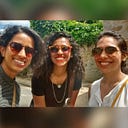January — The month of three cities
New year— new format
Just like the budget speech this year I will be covering up a lot of empty space with verses. Flexing my haiku muscles.
meandering thoughts
how literature listens
to the octothorpe
I spent this month in three cities: 10 days in Chennai, Bangalore, and Jaipur. All of it was tiring in different ways and this of course also meant I was living out of a suitcase — quite an unhealthy life, with no exercise and mostly food outside. At this point, it sounds like an old song that has been going on for almost two years now and I am a little tired of its tune.
In Chennai, I got to meet friends of mine from university, it was pretty kismet-y that we were all in the same place at the same time.
I did start working with the good folks at CivicDataLab. I even managed to meet with some of them in Bangalore, which was fantastic. I am figuring out the different ways in which I can help. It is exciting to be a part of something useful!
I am hitting the various expected roadblocks on my way to a Canadian PR (Permanent Residence) with things taking a long time to process. I guess this gives me time to work on something else, such as the last assignment on my R-programming course, which ends in seven weeks.
Along with this I also managed to spend almost 10 days in Jaipur with friends attending the literature festival. I think I mostly go there for the tandoori chai, friends, and food.
The Jaipur Literature Festival is sponsored by Zee. Zee news has led many campaigns against people it believes to be “anti-national”. Horrible, vile, hate-filled campaigns. I attended this festival soaked in guilt wearing a t-shirt with Bharatiyar’s verse, a battle cry to get righteously angry.
“அச்சம் தவிர் — நய்யப் புடை
மானம் போற்று — ரவுத்திரம் பழகு”
Even more ironically, I listened to Anand Giridharadas talk about rich people who do terrible things and wash over it by putting their names on cultural institutions.
These yearly trips to JLF started the year Margret Atwood decided to come. Since then I have taken part in this navel gaze-y activity. Of course it is useful… in parts. I end up reading books that are not recommended by the my echo chamber. Instead, I find new books on broad topics such as archaeology from space (Sarah Parcak) and the cultural revolution in China and trying to farm in the Gobi desert (Weijian Shan). I also had an opportunity to listen to Abhijit Banerjee talk about his work that got him and Esther Duflo their noble prize for randomized clinical trials in Economics. But with every year I am faced with diminishing returns.
This year, I went with the express intent of trying to understand some of my extended family, especially when they say things like “Hindu's are the minority now”, “Muslims are a threat to the sanatana-dharma” and “what is wrong with wanting a land for ourselves”. Friends of my own political persuasions are likely to ask “why even bother trying to understand these sentiments?” I believe that the tools to disarm such arguments lie in trying to understand them.
There were talks at the literature festival that leaned both heavily to the right and heavily to the left but they were unfortunately kept separate from each other. This segregation ensured neither side would hear from the other without someone explicitly choosing to attend a talk that seemed unappealing to them. I went for some of these talks and my book-buying was influenced by this, which lead me to the V.D. Savarkar book that I recently finished reading.
This book, written by Vikram Sampath, is meticulously researched. However, the author’s non-objectivity (and near-deification) of Savarkar and his ideology is apparent throughout.
Dark patterns are seen throughout the book in the form of the adjectives/verbs used to describe different characters/peoples in the book. The tone used to weave the story is all at once compelling and distressing.
As I was reading this book, my friend Ankur Sethi was reading Ramachandra Guha’s “Gandhi before India” and the same events would be described by both books in very different ways.
A dark pattern is “a user interface that has been carefully crafted to trick users into doing things, such as buying insurance with their purchase or signing up for recurring bills.” — Wikipedia
Our collective history shapes all of us, whether we are aware of it or not. Within both recent history and ancient history, our ideals and ideas are not new or novel. They are just shaped and reshaped. Reading about Savarkar’s ideals and his history packaged inside Sampath’s own views was a small window into some of my relatives’ world views. My own ideals and ideas may be shaped by very different views but both our world views stem from the same history. Maybe listening will help? I don’t know. Maybe I’ll try.
Books Read Recently
உடலெனும் வெளி : பெண்ணும் மொழியும் வெளிப்பாடும் — Ambai
Savarkar: Echoes from a forgotten past — Vikram Sampath

